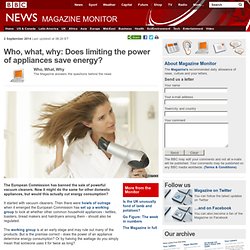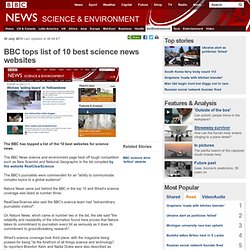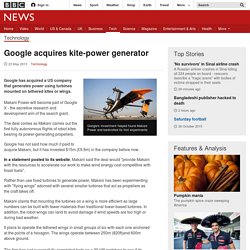

Who, what, why: Does limiting the power of appliances save energy? 2 September 2014Last updated at 06:20 ET Who, What, Why The Magazine answers the questions behind the news The European Commission has banned the sale of powerful vacuum cleaners.

Now it might do the same for other domestic appliances, but would this actually cut energy consumption? It started with vacuum cleaners. Then there were howls of outrage when it emerged the European Commission has set up a working group to look at whether other common household appliances - kettles, toasters, bread makers and hairdryers among them - should also be regulated. The working group is at an early stage and may rule out many of the products. Take hairdryers. Continue reading the main story The answer No clear relationship between motor size and overall energy consumption More efficient engines and better product design can be more important than power Many products, such as hairdryers, use far more energy than is needed to do the job.
Facebook's Internet.org aims to get billions online. 21 August 2013Last updated at 08:04 ET By Dave Lee Technology reporter, BBC News The Facebook founder said he wants to give people the "power to connect" An initiative to bring internet access to the "next five billion" people has been launched by Facebook founder Mark Zuckerberg.

The social network has teamed up with Ericsson, MediaTek, Nokia, Opera, Qualcomm and Samsung, among others, to lower the cost of mobile data. The group said it wanted to help those in developing countries to become part of the internet community. But one expert said those nations had "other priorities" to deal with first. Mr Zuckerberg said the goal was to make "internet access available to those who cannot currently afford it". The group's statement said only 2.7 billion people - just over one-third of the world's population - had access to the internet.
Central to the group's plans is to be more "data efficient" by researching ways to use less data to load websites or load apps. BBC tops list of 10 best science news websites. 30 July 2013Last updated at 06:49 ET The BBC has topped a list of the 10 best websites for science news.

The BBC News science and environment page beat off tough competition such as New Scientist and National Geographic in the list compiled by the website RealClearScience. The BBC's journalists were commended for an "ability to communicate complex topics to a global audience". Nature News came just behind the BBC in the top 10 and Wired's science coverage was listed at number three. RealClearScience also said the BBC's science team had "extraordinary journalistic instinct". On Nature News, which came at number two in the list, the site said "the reliability and readability of the information found here proves that Nature takes its commitment to journalism every bit as seriously as it does its commitment to groundbreaking research".
Wired's science coverage took third place, with the magazine being praised for being "at the forefront of all things science and technology".
Smart meters: Hacking fear ahead of nationwide roll-out. Google acquires kite-power generator. Google has acquired a US company that generates power using turbines mounted on tethered kites or wings.

Makani Power will become part of Google X - the secretive research and development arm of the search giant. The deal comes as Makani carries out the first fully autonomous flights of robot kites bearing its power-generating propellers. Google has not said how much it paid to acquire Makani, but it has invested $15m (£9.9m) in the company before now. In a statement posted to its website, Makani said the deal would "provide Makani with the resources to accelerate our work to make wind energy cost competitive with fossil fuels". Rather than use fixed turbines to generate power, Makani has been experimenting with "flying wings" adorned with several smaller turbines that act as propellers as the craft takes off. Makani claims that mounting the turbines on a wing is more efficient as large numbers can be built with fewer materials than traditional tower-based turbines.
China's solar panel industry facing gloomy times.